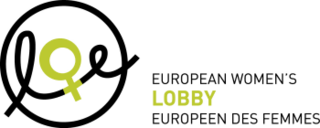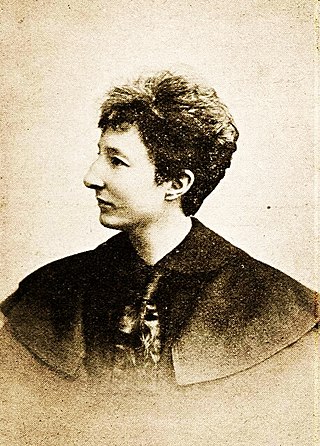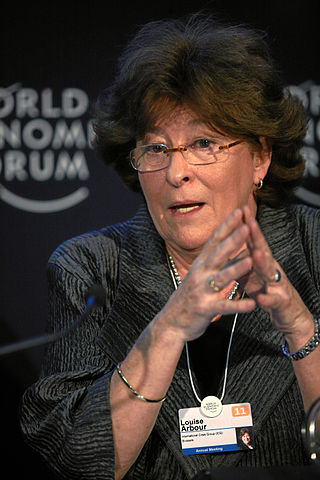Related Research Articles
Liberal feminism, also called mainstream feminism, is a main branch of feminism defined by its focus on achieving gender equality through political and legal reform within the framework of liberal democracy and informed by a human rights perspective. It is often considered culturally progressive and economically center-right to center-left. As the oldest of the "Big Three" schools of feminist thought, liberal feminism has its roots in 19th century first-wave feminism seeking recognition of women as equal citizens, focusing particularly on women's suffrage and access to education, the effort associated with 19th century liberalism and progressivism. Liberal feminism "works within the structure of mainstream society to integrate women into that structure." Liberal feminism places great emphasis on the public world, especially laws, political institutions, education and working life, and considers the denial of equal legal and political rights as the main obstacle to equality. As such liberal feminists have worked to bring women into the political mainstream. Liberal feminism is inclusive and socially progressive, while broadly supporting existing institutions of power in liberal democratic societies, and is associated with centrism and reformism. Liberal feminism tends to be adopted by white middle-class women who do not disagree with the current social structure; Zhang and Rios found that liberal feminism with its focus on equality is viewed as the dominant and "default" form of feminism. Liberal feminism actively supports men's involvement in feminism and both women and men have always been active participants in the movement; progressive men had an important role alongside women in the struggle for equal political rights since the movement was launched in the 19th century.

The Norwegian Association for Women's Rights is Norway's oldest and preeminent women's and girls' rights organization that works "to promote gender equality and all women's and girls' human rights through political and legal reform within the framework of liberal democracy." Founded in 1884, NKF is Norway's second oldest political organization after the Liberal Party. NKF stands for an inclusive, intersectional and progressive mainstream liberal feminism and has always been open to everyone regardless of gender. Headquartered at Majorstuen, Oslo, NKF consists of a national-level association as well as regional chapters based in the larger cities, and is led by a national executive board. NKF has had a central role in the adoption of all major gender equality legislation and reforms since 1884.

The European Women's Lobby (EWL) is the largest umbrella organization of women's non-governmental associations in Europe working for the interests of women and girls in all their diversity and gender equality in all areas of life.
Erna Scheffler, born Friedental and later Haßlacher was a German senior judge.

Anita Theodora Johanna Sophie Augspurg was a German jurist, actress, writer, activist of the radical feminist movement and a pacifist.
Feminism in Germany as a modern movement began during the Wilhelmine period (1888–1918) with individual women and women's rights groups pressuring a range of traditional institutions, from universities to government, to open their doors to women. This movement culminated in women's suffrage in 1919. Later waves of feminist activists pushed to expand women's rights.
Feminism in South Korea is the origin and history of feminism or women's rights in South Korea.
Taiwan has a complex history of feminist and women's rights movements with periods of progressiveness where feminism and strong female icons flourished and periods of strict authoritarianism where equality and individual rights were devalued. Thanks in part to the work of generations of feminists, Taiwan is nowadays one of the most gender-equal countries in Asia, consistently ranking higher than its East Asian neighbors in international indices on gender equality.
Feminism in Sweden is a significant social and political influence within Swedish society. Swedish political parties across the political spectrum commit to gender-based policies in their public political manifestos. The Swedish government assesses all policy according to the tenets of gender mainstreaming. Women in Sweden are 45% of the political representatives in the Swedish Parliament. Women make up 43% of representatives in local legislatures as of 2014. In addition, in 2014, newly sworn in Foreign Minister Margot Wallström announced a feminist foreign policy.

Women in law describes the role played by women in the legal profession and related occupations, which includes lawyers, paralegals, prosecutors, judges, legal scholars, law professors and law school deans.

Ruth Halperin-Kaddari is an Israeli legal scholar and international women's rights advocate who is known for her work on family law, feminist legal theory, women's rights in international law, and women and religion. She was a member of the United Nations Committee on the Elimination of Discrimination against Women from 2006 to 2018, and was the committee's vice chair during several terms. She is Professor of Law at the Bar-Ilan University and is the founding Academic Director of the Ruth and Emanuel Rackman Center for the Advancement of the Status of Women. She is also involved in international academic collaborations on the theme of women, state, and religion, and participates in international litigations as an expert on Israeli family law.

Margarete Berent, also known as Margareth Berent or Grete Berent in the United States, was the first woman lawyer in Prussia. She was the co-founder of the Association of Women Jurists and Association of German Women Academicians. As a Jew, she suffered from persecution during the Nazi Regime and fled via Switzerland, Italy, and Chile to the United States, where she finally arrived in 1940. After studying American law, she opened her second own law firm, now in the US, in 1951.
Else Koffka was a German lawyer and judge at the Federal Court in Berlin. She was one of the first women to do her doctorate at the Faculty of Law at the Humboldt University, again one of the first women who took a faculty assistant position at a university in Germany, becoming the first German lecturer in criminal law, who received a legal teaching assignment without previous habilitation. Since the early 1920s, Else Koffka belonged to numerous professional organizations and associations, including the German Academic Women's Association from 1921 until its dissolution in 1936, the German Lawyers Association from 1921 to its 1933 dissolution, the Legal Society Berlin, from 1924 the German Lawyer's Day, and from 1925 the International Criminal Association.
Renate Lenz-Fuchs was a German lawyer and honorary chairman of the German Lawyers' Association and founding member of the International Federation of Woman Lawyers (FIDA). Lenz-Fuchs was one of the first women to study law in Berlin, Königsberg and Bonn. During her work as a notary, she advocated equal rights for men and women, the revision of divorce law, guardianship and children's rights, and the reorganization of abortion.
Anne-Marie Hofmann was a German lawyer. She studied law at the University of Münster and in Heidelberg. In 1972, she was appointed federal prosecutor at the Federal Court. For twelve years, she remained the only federal prosecutor in the history of justice in the Federal Republic.
Hertha Engelbrecht was a German lawyer, as Senate director for 27 years head of the representation of the Free and Hanseatic City of Hamburg at the Federal. In addition, she was chairman, honorary chairman and managing director of the German Lawyer's Association. In 1965, she became the successor to the lawyer Charlotte Graf chairwoman of the German Lawyer's Association (djb) and held this function for two years until 1967. Subsequently, she followed the notary and former chairman Renate Lenz-Fuchs as chairman, while she was honorary chairman of the djb. After her retirement on March 27, 1985, Niels Jonas succeeded her as head of the representation of the Free and Hanseatic City of Hamburg to the federal government. In 1986, she became honorary executive director of the djb in Bonn and retained this position until 1997.
Elsbeth von Ameln was a German lawyer to the Allied military courts and later in the office - and Cologne Regional Court.
The Women's Declaration International (WDI), formerly the Women's Human Rights Campaign (WHRC), is an international advocacy organisation founded in the United Kingdom. WDI has published a Declaration on Women's Sex-Based Rights, and has developed model legislation to restrict transgender rights that has been used in state legislatures in the United States.

The National Council of German Women's Organizations – German Women's Lobby is a German umbrella organization for organizations concerned with women's rights and gender equality. One of Europe's largest women's organizations, it includes 62 member organizations with 11 million members.
Else Rahel Samulon-Guttmann was a German lawyer and one of the first female judges in Prussia.
References
- ↑ Lieber, Dorotea (2003). Juristinnen in Deutschland. Baden-Baden: Nomos. ISBN 3-8329-0359-3.
- ↑ "75 Jahre djb: Feministische Außenpolitik in Zeiten von Krisen und Konflikten". Deutscher Juristinnenbund. Retrieved 2024-03-06.
- ↑ "Stellungnahme: 23-16: zum Referentenentwurf „Selbstbestimmungsgesetz" vom 09.05.2023". Deutscher Juristinnenbund. Retrieved 2024-03-06.
- ↑ "„Eine Kriminalisierung von Sexarbeit schützt nicht vor Zwang, sondern führt zu mehr Gesundheitsrisiken, Gewalt und prekären Lebensverhältnissen."" . Retrieved 2024-03-06.